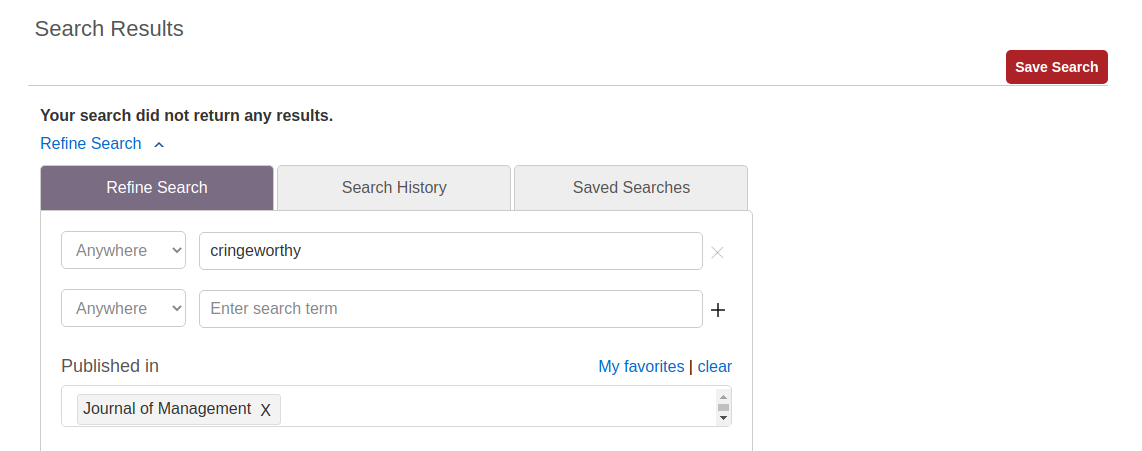Cringeworthy Management
If you go to the Journal of Management1 and you search for the word cringeworthy (and all its possible variations), you get zero results:
(For cringe you get just a few very irrelevant results)
How come cringe is not something actively present in management research? I would have expected quite some results, since I have personally profusely cringed throughout these almost 20 years of career thanks to the many different cringeworthy managers I’ve had the pleasure to work with (disclaimer: luckily, not all of them were so).
I bet you have felt it. It’s that strong recoil when you hear a manager or leader say something so awkward, so unnatural you want to crawl under a table. It can be a vapid, artificially epic quote, the excessive use of pseudo-heroic figures of speech including lions, wolves, warriors. A manufactured message thrown to #general in Slack to say something the world (and the organization) would have totally survived from if gone unsaid. A quote from Sun Tzu (damn those are cringey). It can be a grammatically or semantically horrific mistake in some company-wide presentation. Can be the unsystematic use of buzzwords: data-driven, revolutionary, actionable, going forward, low-hanging fruit. Can come from seeing their technical rudimentariness exposed in the open during a meeting after an incisive question from a customer who -unexpectedly- knows his shit. Can be a poorly crafted email whose idea is ugly and disconnected. Can be a manager hijacking credit or aggrandizing his work when you and others know the truth (this can be both cringey and inflaming). Can be the politely forced team bonding activity where you find yourself camping out with your boss while he won’t stop talking about himself around a bonfire and you wish a bear would hopefully jump out from the trees and eat you all just to end your misery2. It can be your manager’s shameless adulation of someone higher up the hierarchical ladder.
It goes as if some managers wouldn’t be aware that one of the main traits of being a manager is navigating the ultra-thin line between being inspiring and being unforgivably cringeworthy.
What is that managerial cringe after all? Since we cannot rely on research because there is not much3, let’s do some qualitative analysis here of what cringeworthy management is. Managerial cringe kicks in when the fake, artificial or the overreactive rings louder than what’s being actually said. Why does it ring so loud? The key is legitimacy. When the legitimacy of the source is dubious or questionable, when he or she has no skin in the game, or speaks from a privileged position which is not exposed to the elements as the ones they are addressing and asking sacrifices from, the cringe factor soars because their epic narrative sounds with the echo of a massive, empty room. This is the sweet revenge of the hierarchies: those sitting high in the org chart can’t automatically buy legitimacy with their higher-than-most salaries, so they are damned to make extra efforts to avoid the team shrug in collective distaste when there’s a meeting with them coming up in the calendar.
Legitimacy helps mitigate the cringe, but does not nullify it. Still, it is very much needed to always avoid the manufactured grandeur, the corny quotes, the platitudes, the vapid mottoes parroted ad nauseam.
Management, simply put, boils down to one and only one golden rule:
Don’t be cringey
I am of the idea that team outing activities not happening naturally are a good indication of a team not bonding and you that can’t force meaningful bonding just by sending people to go-karts.
There’s not much around management. There is research about the psychology of embarrassment and cringe, see: https://qz.com/quartzy/1205507/this-is-why-you-cringe-when-someone-else-embarrasses-themselves/


